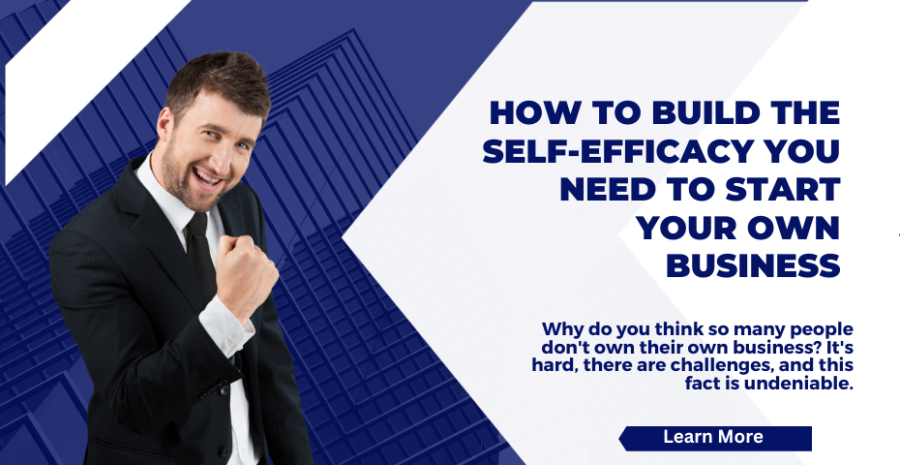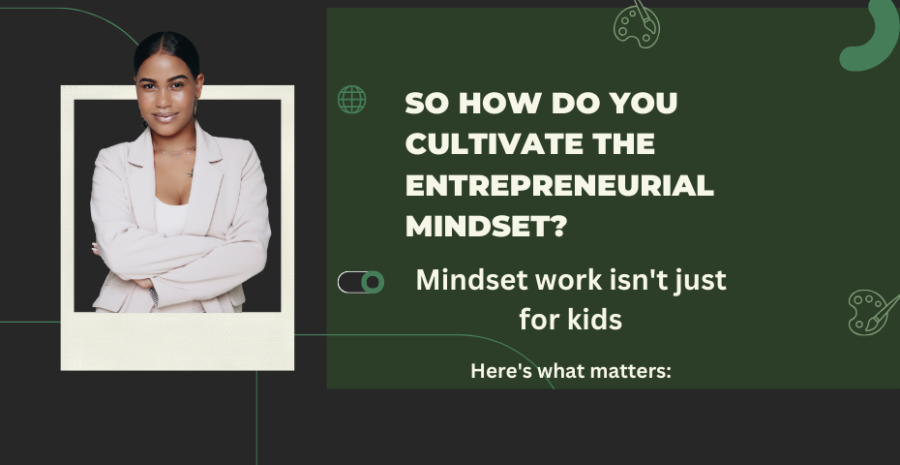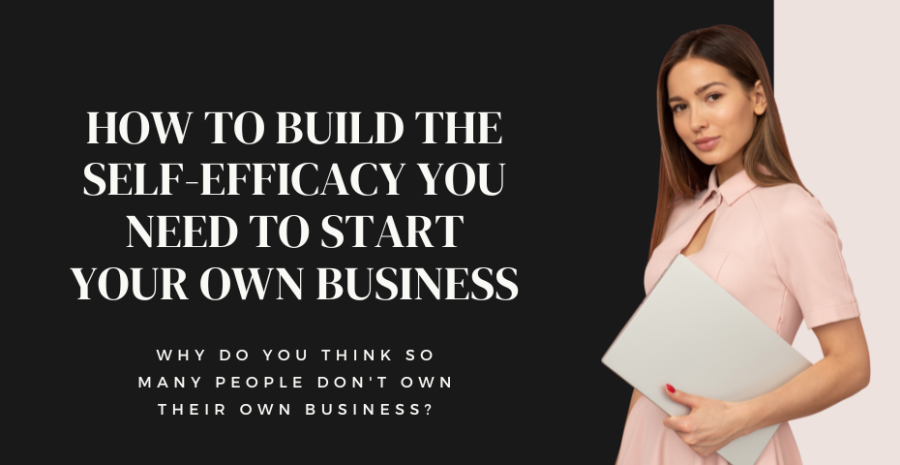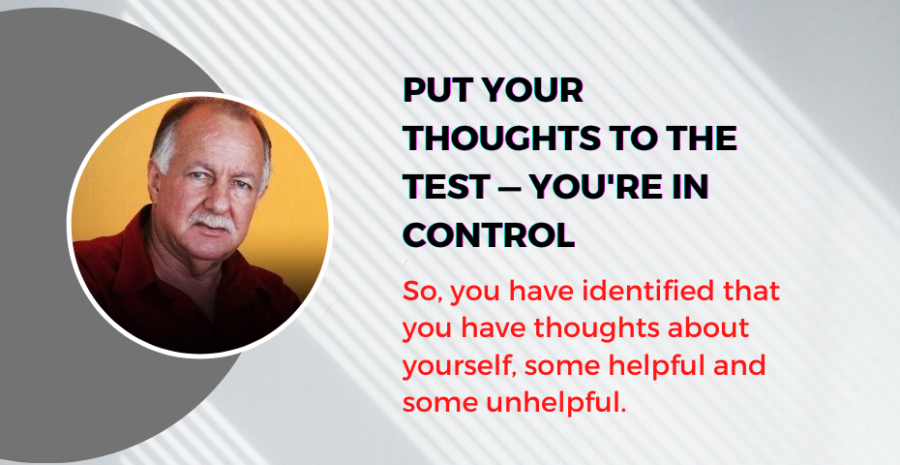
How to Build the Self-Efficacy You Need to Start Your Own Business.

I often say that starting a company is like jumping off a cliff and building an airplane on the way down. It's a vivid metaphor that contains a lot of truths. First, you'll need courage and optimism. You have to believe you can pull it off. Next, you'll need ingenuity. Assembling a plane takes talent and skill, even under calm circumstances. In the chaotic rush of a death-defying plunge, you need agility. You need to react quickly. You need to be calm under pressure. You need to find the plunge exhilarating.
And then there are the stakes. If you don't assemble the plane in time, you crash. In real-world terms, you run out of money. This is why speed matters. Once you jump off the cliff, the ground comes at you fast. It's why, in almost every case, a slow-moving startup is dead. That's part of what makes entrepreneurship so grueling — because the default outcome, until you get the whole plane running, is death. Not just for you but also everyone you persuaded to jump with you.
Mindset work isn't just for kids. So how do you cultivate the entrepreneurial mindset?

Here's what matters:
1. You have to learn and unlearn at the same time. Entrepreneurial mindsets — for example, making quick decisions or letting fires burn — often run directly counter to what we're taught in school.
2. Learn through story, and not just theory. Most people learn best through the experiences of other entrepreneurs. Narratives make the theory stick.
3. Adopt a daily habit to reinforce a new mindset. It's important to listen, to read, and to write. But it's not enough. You have to act on what you've learned to live a new mindset.
There are many ways to cultivate entrepreneurial mindsets, from books to courses to peer groups with other founders. Technology has an important role to play here, too, in helping us build the daily habits that create mind shifts.

Why do you think so many people don't own their own business? It's hard, there are challenges, and this fact is undeniable. You may even be thinking to yourself that these challenges are ones only certain people can tackle. You know, the kinds of people who excelled all through high school and had the confidence to jump into anything head first. But what if I told you that the only thing that separates you from them is yourself? Ah, that's obvious, you might be thinking. But let me challenge this notion a bit more. It isn't you as a person, it's your beliefs — those ideas in your head of what you can and cannot do.
The only thing which differentiates that guy in high school who became captain of the football team and you is the fact he believed he could do it. That is all there is to it. The good news? You can do whatever you want, and it is completely in your control. Let me introduce the concept of self-efficacy.

Let's do a thought experiment together. Think of something uncomfortable to you. It might be getting back into the gym after some time. Or it could even be something like going out on a date. What makes it uncomfortable? Is it the activity itself? Actually, it's your belief about what you can and cannot do. If you believed that you would be able to go back to the gym on day one and nail it, you would probably go.
We all have beliefs about ourselves — some helpful and others that aren't as helpful. This is called self-efficacy: your beliefs about your ability to do a certain task. When you don't think you can do it, the task seems more daunting, and you put it off. It might even make you develop even more unhelpful beliefs about yourself because you now feel bad about your belief you can't do it! But what if we flipped this notion on its head, and instead of thinking we can't, we start thinking we can? This leads to challenging those beliefs you have about yourself.

Okay, another thought experiment. Think of a task you have perfected. Something you can do so well now which you couldn't before. Even something as simple as the fact you can ride a bike would fall into this category. Let's go back in time to the version of you who just started to learn how to ride a bike. What would they say? "I'm not very good at this" or "This is too hard" or any variation of these statements. But you did it, right? I guarantee 100% you have conquered something like this in your life.
What does this mean? Your thoughts are not the truth, and the thoughts you have about yourself may not be the truth either. You have thought many unhelpful things of yourself throughout your life, which without your awareness, you have proven wrong. This awareness helps us realize that all the things we think about ourselves are indeed not facts. And it allows us some space to challenge these thoughts.

So, you have identified that you have thoughts about yourself, some helpful and some unhelpful. You also know now that those unhelpful thoughts are not always true because you have proven it to yourself. So, how do we get you to challenge your present thoughts about yourself on what you want to do now?
Step 1. Identify the thought
You can't work on something when you don't know it's there. And I know, it's uncomfortable to admit to yourself that you don't think you're smart enough or strong enough or whatever quality it is to start your own business. Don't worry about this step, though. Remember: Your thoughts are not truths. When you say to yourself, "I realize I am thinking I am not good enough to start my own business," also say to yourself, "It's my thought, but it is not the truth." You just need to know you're thinking it to begin to tell that thought, "You're wrong, I know I can."
Step 2. Externalize yourself from the thought
Remember how your thoughts are not the truth about you? Guess what? They aren't even you. We have thousands of thoughts come into our heads every day from all different sources. Maybe someone said something negative to you, and you contemplated it. It's just a thought, it's not you. Now you need to take that thought and give it a name. It just needs to have a label. You could call it anything. When you label something, you see it not as yourself. And then you can start to see it for what it really is. This is called externalizing — this is when you say my thoughts are not me, they are a thing I experience.
Step 3. Challenge that thought
Get that thought now, call it by its label, and analyze it. What validity does it really hold? Let's say, for example, you have a thought that you're not smart enough to start your own business, and this thought is called Not Smart. You are now going to tell Not Smart how not smart it is. What does Not Smart tell you? It might be telling you, "You don't have the intelligence to do this."
"Okay, Not Smart, how do you know?" It might say back to you, "Well you remember how in your first job you got the least amount of sales in the team?" And you say, "So what?"
Not Smart might say back, "Yeah, well how do you think you're going to start a business then?" You just say back to Not Smart, "That's true, that did happen, but why does one mistake mean I am going to make mistakes forever?"
Keep challenging it! Keep saying back, "I haven't even done anything like that since then, and it made me grow, and now I actually have so many skills to do what I want." Or say back, "Okay, I don't have the answers, so what? I can learn them. What's stopping me?"
The truth is that Not Smart or any of these thoughts are actually your mind trying to protect you. Your mind has a good ability to detect threats from the past and project them into your future to try and do what it seems to think is keeping you safe. If you did get the lowest sales in your first job, your mind will say, "Okay we need to avoid anything with business because this hurt you before, and I don't want you to hurt again." What you need to tell your mind is that "It's okay, it's not going to hurt me. This is actually what is going to bring me the most happiness in the end."
Step 4. Create a new narrative, and assign a new meaning
It's not enough to just tell Not Smart that it's wrong — you've got to give it a whole new story to rewrite the old one. And this story needs to be exactly what you want it to be. Let's give it a go together.
So, Not Smart told you that you're not intelligent enough to run your own business, and you proved to it that its logic is actually flawed and that you do have the intelligence. What you need to do here is create a new story on this narrative. It could go something like this: "I haven't always been number one in my sales roles, but that is why I am going to prove to myself and everyone else that I can be successful and run my own business. I'm going to make sure I get the knowledge on how to do it because it's accessible to anyone. I am going to use my previous failure to be my driving energy to succeed."
And there you go, you now have yourself a new narrative. Write it down. You need to have this written down, and you need to go back to it whenever Not Smart comes back up again. Go back to your new narrative, and feel your narrative in your body through your emotions. This is your new story now, and soon enough, it will become your new belief.
Just to end on a thought-provoking note, do you know the story about Beethoven? One of the most famous classical composers of all time was actually deaf. But he still composed. He didn't just compose, either — he wrote his most famous piece of music at this time. What if he believed he couldn't do it? Or what if he thought, "What's the point?" Even without hearing, he still became one of the greatest composers in history.
Now it's time for you to make your own history and start that business you have been dreaming of. Trust me when I say this, and I really mean it when I do: There is nothing stopping you but those funny little beliefs you have about yourself. Make your own story, and rewrite your future.
You've got this.
Markethive - Built Exclusively for Entrepreneurs

At the crossroads of innovation, where the worlds of inbound marketing and blockchain technology converge, lies Markethive, a platform that is rewriting the rules of engagement. It's not just a platform; it's a visionary approach that melds the power of inbound marketing, the potential of blockchain technology, and the strength of a vibrant community, all fueled by its very own cryptocurrency, ‘Hivecoin.’ This cryptocurrency isn't just a digital token; it's a symbol of collaboration and a medium of exchange for ideas, services, and value.
Visualize a terrain where traditional marketing techniques are no longer sufficient, customer relationships are not just transactions but genuine connections, and security and transparency are paramount. This is the landscape that Markethive is helping to shape, offering a fresh perspective on how businesses can interact with their audiences.
More detaled info>> HERE
.jpg)
About: Andries vanTonder
Over 40 years selfemployed
He is a Serial Entrepreneur, an Enthusiastic supporter of Blockchain Technology and a Cryptocurrency Investor
Find me: Markethive Profile Page | My Twitter Account | My Instagram Acount | and my Facebook Profile.
